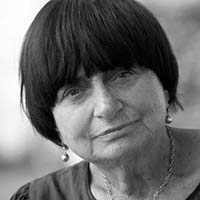

Le Bonheur (Happiness) is an incredibly beautiful, compelling exploration of the meaning of happiness and how to achieve it in modern day society. The film focuses on a happy, handsome, young family of four. It opens on a scene of an idyllic, lazy afternoon in the forest. Surrounded by saturated green, François (Jean-Claude Drouot) and Thérèse (played by Jean-Claude’s real wife Claire Drouot) seem utterly in love with each other and with their two small children (played by the couple’s real children) as they enjoy a day in the countryside. The whole scene is bursting with vivid color, strains of cheerful Mozart, and the utter happiness of the family. The next day François returns to his job as a carpenter while his wife works as a seamstress (while completing successive domestic tasks in a series of shots that surely influenced Jeanne Dielman (1975)). We soon see signs of his selfishness and her complacency: he picks at dinner, insisting he is hungry, while she half-heartedly asks him to wait five minutes until it is finished. However, there are no signs of resentment from either character; both seem incredibly content and in love, happy with each other and their lives.
A few days later, François meets Émilie, an attractive young post office worker. Without hesitation, he begins to have an affair with her. He explains to her that he is very happy at home, and loves his wife and children dearly, but also loves her. Émilie only adds to his happiness and he has no qualms about lying to Therese about his whereabouts when he is with her. However, as the affair continues, Émilie approaches François about her discomfort in thinking about him with his wife. He replies that had he met Émilie first, he would be living with her. But he can’t help that Thérèse came first and that he loves her. He has enough joy for the two of them, he assures Émilie.
Eventually, Thérèse asks François why he is especially happy lately at another country outing. He explains that “more happiness” is making him happier. As she probes him for more (“You wouldn’t understand, he initially tells her), he finally admits to the affair. Thérèse is first upset, and François repeatedly grabs her face to force her to look at him while he explains his rationale. He is simply happier now, can’t she tell? Hasn’t he been even more loving to her and the children lately? Is it affecting his behavior towards her at all? She finally succumbs and accepts his rationalization. They passionately make love, but when he awakes she is gone. He frantically searches for her until her drowned body washes onto the shore: she committed suicide. François is genuinely heartbroken by her death, but it does not stop him from visiting Émilie once more. She soon takes the place of Thérèse, as evident in the final scene in the forest, identical to the opening except that it is now fall, and one blonde has replaced another.
This film asks some very difficult questions regarding the pursuit of one’s own happiness as a single goal. What makes the film so intriguing is Varda’s own ambiguous feelings on the subject matter. She does not choose a side, and does not condemn any character. All characters, even François, are still likeable by the end, making this a difficult film to judge. However, it is an enjoyable film, entertaining and viscerally beautiful on the surface, and teeming with difficult moral questions beneath.
For further reference:
New York Times Review
Also check out Filming Desire: A Journey Through Women’s Film, in which Varda is interviewed about her practices in filming sexuality from a feminist perspective.




